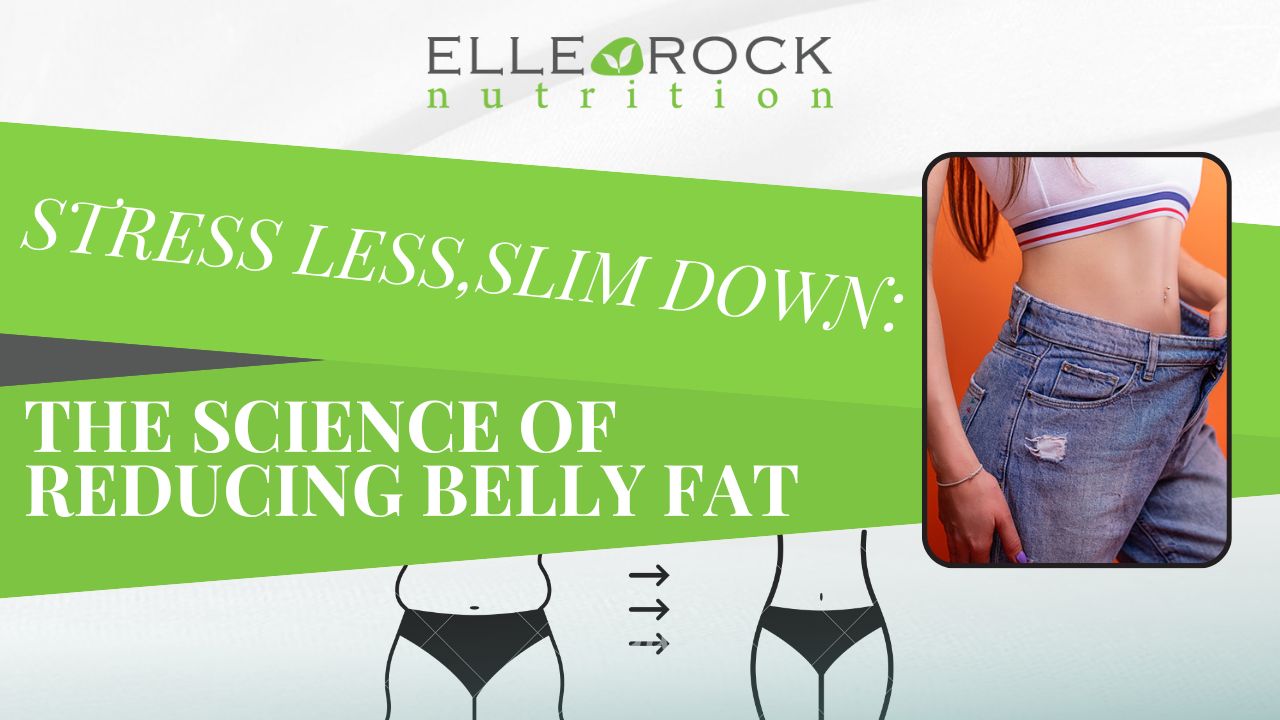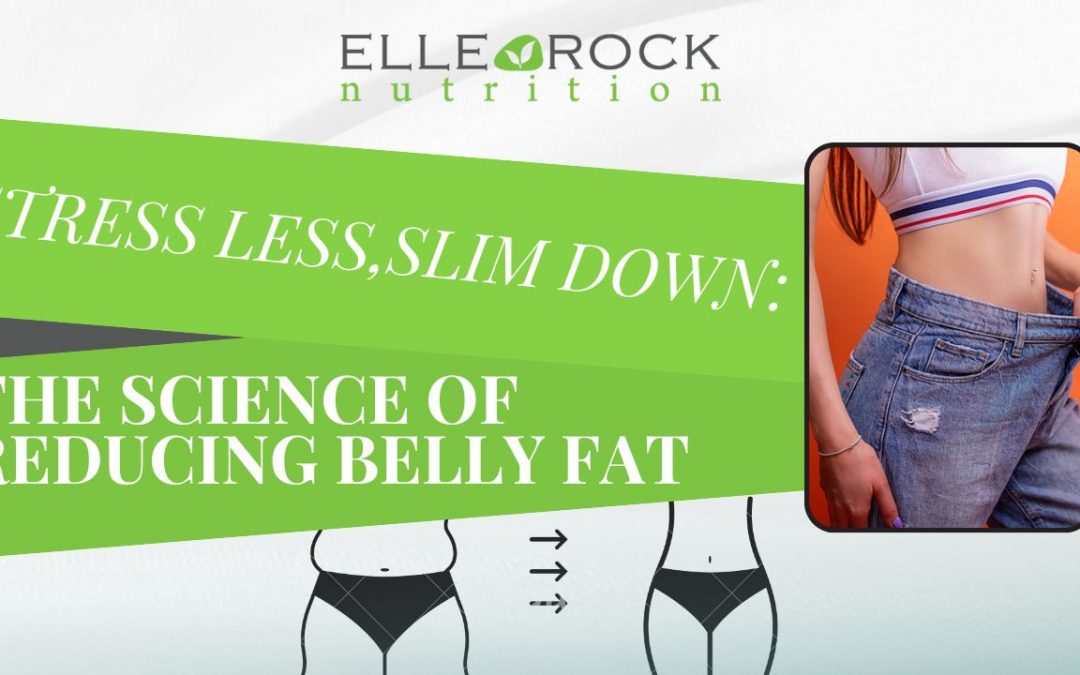Unlocking the Secret to a Slimmer Waist: Stress Reduction for Belly Fat Loss!
The Hidden Culprit: Stress and Abdominal Fat
In the quest for a healthy body and a slim waistline, many of us diligently follow diet and exercise regimens, hoping to shed excess weight and tone up our midsections. Now obviously, as a BANT Registered Nutritionist®, I wholeheartedly approve of people eating healthily and exercising. However, I often find myself having to explain to people who are trying to reduce belly (abdominal) fat that there’s a silent saboteur lurking in the shadows that can make it appear like your diet and physical activity efforts are futile. This culprit is chronic stress!
So in this article, we are going to delve into the intriguing connection between stress and abdominal fat from a functional medicine standpoint, and then equip and empower you with actionable strategies to help conquer stress and win the battle of the bulge.
The Stress-Abdominal Fat Connection
Stress is a normal part of life, but chronic stress can wreak havoc on our bodies. When we experience stress, our bodies release a hormone called cortisol, which is often referred to as the “stress hormone.” Cortisol serves a vital purpose in the short term, helping us cope with immediate stressors, such as the classic “fight or flight” response. However, when stress becomes chronic, cortisol levels can remain elevated, leading to a range of adverse effects on our health. One of the areas most affected by elevated cortisol levels is our abdominal region.
Here’s how chronic stress contributes to stubborn belly fat:
- Increased Fat Storage: Cortisol signals the body to store fat, primarily in the abdominal area. This evolutionary response once helped our ancestors survive in times of famine, but in our modern lives, it can lead to unwanted weight gain, especially around the midsection.
- Appetite Dysregulation: Stress often disrupts our normal eating patterns. Some people may find comfort in ultra-processed, high-calorie, sugary foods during stressful times, while others may lose their appetite altogether. These fluctuations can lead to overeating or undereating, both of which can contribute to weight gain and abdominal fat.
- Insulin Resistance: Chronic stress can lead to insulin resistance, a condition where the body’s cells become less responsive to insulin. This can result in elevated blood sugar levels, increased fat storage, and a higher risk of developing type 2 diabetes – all factors that contribute to abdominal fat.
- Poor Sleep: Stress and sleep are closely intertwined, as touched upon in a previous article of mine. Chronic stress can disrupt sleep patterns, leading to poor-quality sleep or insomnia. Inadequate sleep can, in turn, disrupt hormones that regulate hunger and appetite, making it more challenging to maintain a healthy weight.

Breaking the Stress-Belly Fat Cycle
As a Registered Nutritional Therapy Practitioner [RCNHC MBANT], I work within the Functional Medicine framework which takes a holistic approach to health, focusing on the root causes of health issues rather than just dealing with symptoms. When it comes to managing stress and its impact on abdominal fat, I generally encourage the following strategies:
- Stress-Busting Techniques: Incorporate stress-reduction practices into your daily routine. Consider trying mindfulness meditation, pilates, yoga, deep breathing exercises, or progressive muscle relaxation to lower cortisol levels and cultivate calm.
- Prioritise Sleep: Boost sleep quality by creating a comfy sleep environment, sticking to a regular sleep schedule, and steering clear of screens before bedtime.
- Balanced Nutrition: Fuel your body with whole, unprocessed foods, supplying the nutrients needed for hormone balance. Cut back on sugar and processed foods, which can exacerbate stress-induced appetite swings.
- Get Moving: Engage in regular physical activity to reduce stress and support weight management. Blend aerobic exercise with strength training for maximum impact.
- Tackle Stressors Head-On: Identify and address chronic stress sources in your life. Set boundaries, seek support, or make changes to your work or personal life to regain control.
Manage stress for a slimmer waistline and a healthier you
In your quest for a healthier, slimmer you, remember that stress wields significant influence over abdominal fat. Even with a wholesome diet and regular exercise, chronic stress can thwart your progress. By embracing a functional medicine approach that targets stress at its core and prioritises overall well-being, you can break free from the stress-weight gain cycle and work toward a happier, healthier you. It’s not just about looking great; it’s about feeling fantastic from the inside out.
Remember, seeking guidance from a knowledgeable professional can be a game-changer on your journey to better health. If you’re looking for personalised nutritional advice and strategies to combat stress-related abdominal fat, consider reaching out to a Registered Nutritional Therapy Practitioner [RCNHC MBANT] like myself. I am here to provide the expertise and support you need to thrive both inside and out.
So, let’s roll up our sleeves and tackle that stress head-on, one mindful breath and peaceful night’s sleep at a time, with the guidance of your trusted professional by your side.
Have a free chat with a nutritionist
Have a free chat with me and let’s talk about how we can achieve your health goals [Link below].📲
Elle Rock Nutrition: Be in health, live in freedom!(TM)
LONDON NUTRITIONAL THERAPY CONSULTANCY
Rochelle
BANT Registered Nutritionist® | (group work, academia)
Registered Nutritional Therapy Practitioner RCNHC MBANT | (1:1 clinical nutritional therapy practice)
SUBSCRIBE!
Do you want to hear from me directly? Get the latest ELLE ROCK NUTRITION updates, services, promotions, offers and events! Click here to join the mailing list.
ELLE ROCK NUTRITION ©Rochelle Logan-Rodgers BSc(Hons), PgDip – BANT Registered Nutritionist®

